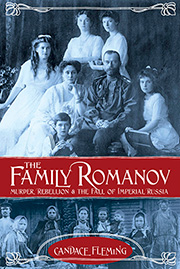BOOKS

Schwartz & Wade, 2020
978–0525646549
ages 12 and up
buy the book
hardcover
e‑book
audio book
After you’ve read The Rise and Fall of Charles Lindbergh, try this book:
The Rise and Fall of Charles Lindbergh
Discover the dark side of Charles Lindbergh — one of America’s most celebrated heroes and complicated men — in this riveting biography from the acclaimed author of The Family Romanov.
First human to cross the Atlantic via airplane; one of the first American media sensations; Nazi sympathizer and anti-Semite; loner whose baby was kidnapped and murdered; champion of Eugenics, the science of improving a human population by controlled breeding; tireless environmentalist. Charles Lindbergh was all of the above and more. Here is a rich, multi-faceted, utterly spellbinding biography about an American hero who was also a deeply flawed man. In this time where values Lindbergh held, like white Nationalism and America First, are once again on the rise, The Rise and Fall of Charles Lindbergh is essential reading for teens and history fanatics alike.
Awards and Honors
- Booklist (starred review)
- Booklist Top Ten Biographies
- Booklist Best Books of 2020
- Bulletin of the Center for Children’s Books (starred review)
- Bulletin of the Center for Children’s Books Best Books of 2020
- CCBC Choices 2021
- Horn Book (starred review)
- Horn Book Fanfare
- Kirkus Reviews (starred review)
- Kirkus Reviews Best Books of 2020
- New York Public Library Best Books of 2020
- Publishers Weekly Best Books of 2020
- Publishers Weekly (starred review)
- School Library Journal (starred review)
- School Library Journal Best Books of 2020
- Wall Street Journal Best Books of 2020
- YALSA Excellence in Nonfiction Award
Reviews
“Fleming skillfully crafts a layered portrait of a controversial figure: Charles Lindbergh. Well-paced sections covering Lindbergh’s soaring popularity and plunging fall are divided into engaging segments. Passages about his early childhood establish his close relationship with his mother and the roots of his loner personality. In riveting detail and frequently quoting from Lindbergh’s diaries and his wife’s, Fleming relates his planning and execution of the solo transatlantic flight that made him the most famous man in the world, his marriage and the tragic kidnapping of his firstborn child, his obsession with engineering humankind’s immortality, and the existence of his multiple secret families. Fleming finely hones the stark contrast between Lindbergh’s rise and his fall from grace after he became fascinated with eugenics, sympathized with Hitler and the Nazis, and involved himself in America-first isolationist politics. A compelling biography of a flawed, larger-than-life man.” (Publishers Weekly, starred review)
“It’s not easy to write the biography of a person who elicits, by turns, admiration, sympathy, and revulsion, but Fleming has accomplished this juggling act, and in doing so, she has created a historical narrative that couldn’t feel more contemporary.” (The Horn Book, starred review)
“In this smoothly written, even-handed biography, Fleming deftly conveys how Lindbergh’s interest in aviation overlapped with an interest in medical technology and efforts to extend life through organ life support, which in turn connected him with eugenicist Alexis Carrel. Under Carrel’s influence, Lindbergh’s own philosophy of human perfectibility burgeoned, and it wasn’t much of a leap for him to articulate hope for a future in which “superior” Aryan whites (like himself) would exceed current life spans and rule the masses in a political system based on scientific reason (like Hitler’s Germany purported to be). While never justifying Lindbergh’s fascist leanings, Fleming contextualizes his rise and fall from public grace within a zeitgeist of technological promise, expanding media frenzy, economic depression, and global political upheaval that enabled a celebrity to become spokesperson for fringe causes. An extensive bibliography and source notes are included, as well as a section of period photographs.” (Bulletin of the Center for Children’s Books, starred review
“Fleming expertly sources and clearly details a comprehensive picture of a well-known, controversial man. Her frequent use of diaries allows much of the story to come through in Charles’ and his wife Anne’s own words. The man who emerges is hateable, pitiable, and admirable all at the same time, and this volume measures up to the best Lindbergh biographies for any audience. A remarkable biography.” (Kirkus Reviews, starred review)
“Though Charles Lindbergh achieved fame and adoration as an accomplished American aviator, he was an overwhelmingly complicated figure. In an eminently readable, at times thrilling, and occasionally deeply disturbing biography, the widely acclaimed Fleming (Amelia Lost, 2011) returns to the skies. In the book’s first section, she tracks Lindbergh’s meteoric rise to American hero, from his solo flight from New York to Paris to his marriage to Anne Morrow and the kidnapping and subsequent death of their child. In the second half, she maps the fall: Lindbergh’s growing disgust with the American press and his anti-Semitism led to an increased admiration of Hitler, and public opinion shifted as he advocated for isolationism and white nationalism. Throughout runs a common thread: as he crossed the Atlantic in the Spirit of St. Louis, as he searched for his missing son, as he argued for eugenics and the environment in turn, Lindbergh was a man obsessed with ending death. Fleming, who takes care to shine the spotlight on Anne as an individual, states that she wanted Charles and Anne to speak for themselves; included dialogue propels the narrative and was taken directly from their journals and letters. Fleming places, in his historical context and ours, a man of intense contradictions. Absorbing and distressing in turns, this utterly prescient capture of a life — and the lives it influenced — is essential in classrooms and for history buffs alike.” (Booklist, starred review)
“Fleming successfully deconstructs the public persona of Lindbergh and highlights how some of the aviator’s core values (nationalism, xenophobia) echo the country’s current political and social unrest. VERDICT A must-read. Drawing on primary sources, including Lindbergh’s own journal, Fleming has crafted a cautionary tale of the downfalls of hero worship.” (Cathy DeCampli, Haddonfield Public Library, NJ, School Library Journal, starred review)
“There is no amped up moralizing in this fascinating chronicle for readers ages 12 to 18: Ms. Fleming lets Lindbergh hang himself, as it were, by word and deed. Encouraged by an American diplomat to tour Nazi Germany’s airfields in 1936 and assess Hitler’s war preparations, Lindbergh swallowed the regime’s propaganda. He extolled “the organized vitality of Germany” and declared that “Hitler is undoubtedly a great man.” A fervent isolationist, Lindbergh trafficked in anti-Semitism that he seems never to have repented. Reprehensible, estimable, complex: Ms. Fleming’s portrait reveals a man of many parts.” (Meghan Cox Gurdon, The Wall Street Journal)
“This sounds familiar to anyone aware of today’s news, and it’s obviously meant to. But Fleming respects her readers’ intelligence and curiosity — she tells us the story, but not what to think about it. Reading the book becomes an interactive experience, with Lindbergh inspiring awe in one chapter, empathy in another, then disappointment and disgust, with a study supply of “Who is this guy?” We get the sense even Anne [Morrow Lindbergh] didn’t understand the man she was living with, and this suspicion is confirmed when Lindbergh’s stunning secret life is revealed in the book’s final section.” (Steve Sheinkin, The New York Times, 23 Feb 2020)


